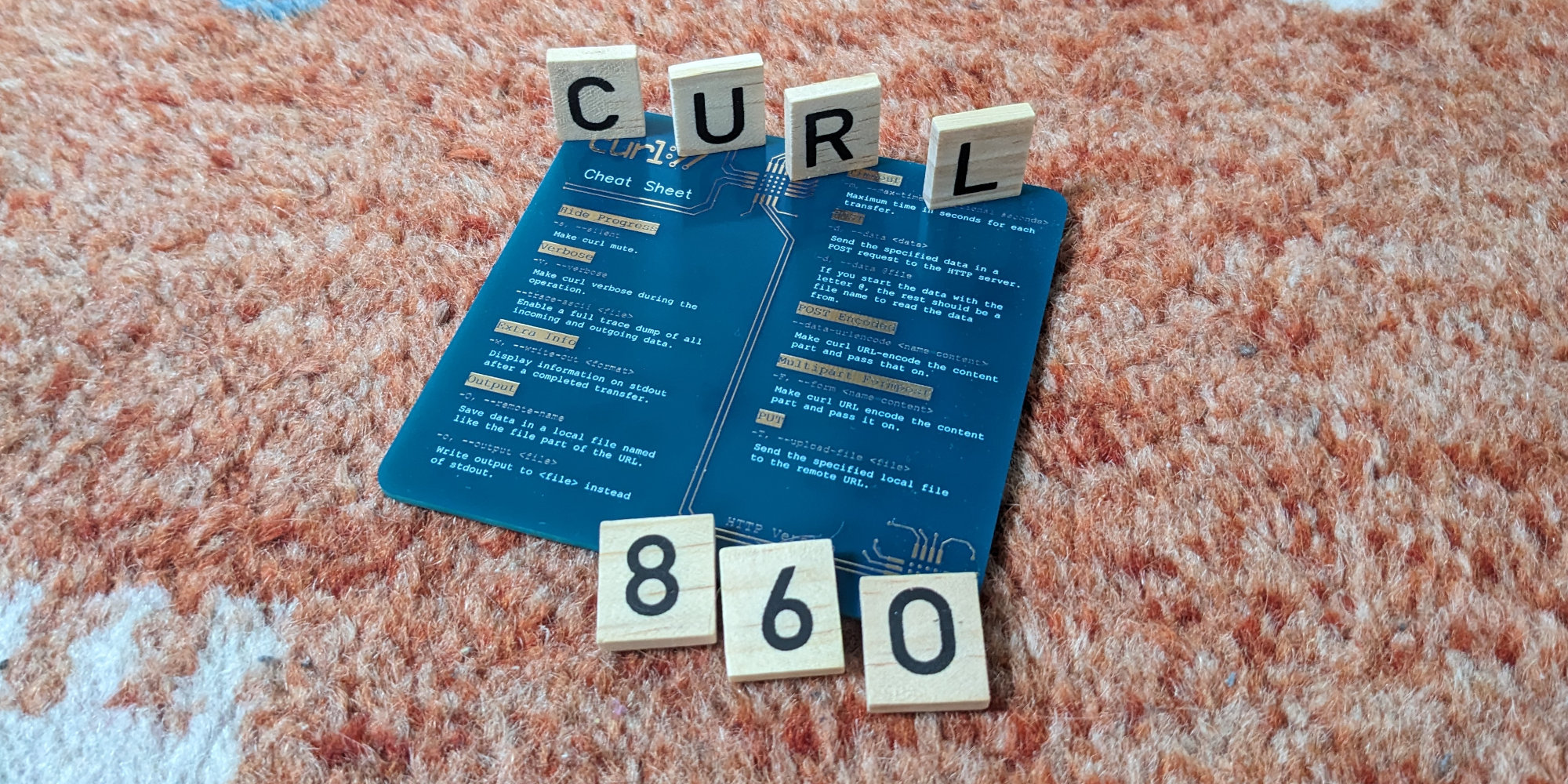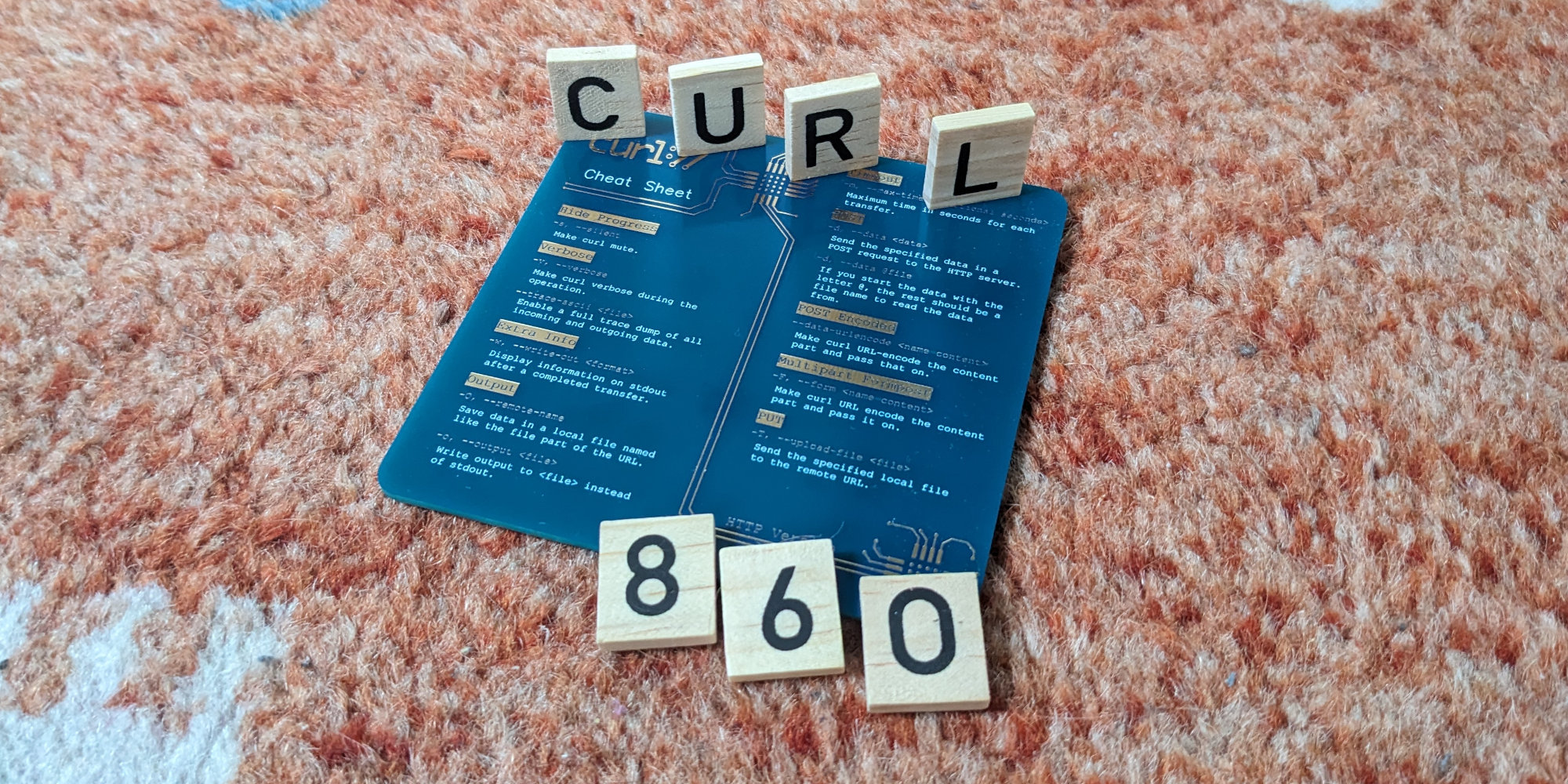
Numbers
the 254th release
7 changes
56 days (total: 9,448)
154 bug-fixes (total: 9,888)
257 commits (total: 31,684)
0 new public libcurl function (total: 93)
1 new curl_easy_setopt() option (total: 304)
0 new curl command line option (total: 258)
65 contributors, 40 new (total: 3,078)
36 authors, 18 new (total: 1,237)
1 security fix (total: 151)
Release presentation
At January 30, 09:00 UTC (10:00 CET), I do a live-streamed release presentation on Twitch. After the fact, I will put a link to the YouTube recording here.
Security
CVE-2024-0853: OCSP verification bypass with TLS session reuse. curl inadvertently kept the SSL session ID for connections in its cache even when the verify status (OCSP stapling) test failed. A subsequent transfer to the same hostname could then succeed if the session ID cache was still fresh, which then skipped the verify status check.
Changes
- Markdown documentation. Most of the libcurl and command line documentation is now written using (basic) markdown instead of previous formats. Easier to read, easier to write.
CURLE_TOO_LARGE. A new libcurl error code for when “something” is growing too big to be allowed. Like a URL, a HTTP request or similar. Previously it would return out of memory for those situations which caused confusion to users.
CURLINFO_QUEUE_TIME_T. Applications can now ask libcurl how long a transfer was “queued” internally before it actually started.
CURLOPT_SERVER_RESPONSE_TIMEOUT_MS. A new millisecond version of the already existing option to allow applications higher resolution control.
- Use GetAddrInfoExW on >= Windows 8. On current Windows versions libcurl will now do asynchronous name resolving by default without using threads, which should be less resource heavy.
- libpsl detection failure in configure causes error. If configure cannot find libpsl it will require the user to say that it should not be used, or to fix the problem. To make people who build curl more aware of the PSL state of the build.
- runtests supports -gl, When you invoke individual test cases on macOS, you can now ask to run it with lldb with
-gljust as you have been able to run it with gdb using-gfor decades. Helps debugging difficult cases.
Bugfixes
Here some of my favorite bugfixes from this cycle:
configure: add libngtcp2_crypto_boringssl detection. Previously it would only detect and build out of the box with the quictls version of ngtcp2 builds.
configure: when enabling QUIC, check that TLS supports QUIC. More efforts trying to detect wrong and invalid build combinations earlier, to avoid users ending up with broken builds.
all libcurl man page examples are verified in CI. Every man page example now compiles cleanly. This step made us detect and fix numerous tiny mistakes of the most annoying kind: when you copy code from docs and it does not work.
curl shows ipfs and ipns as supported “protocols”. In the regular --version output. Even if they are converted to https:// internally.
curl bsearches command line options. The command line parsing is now magnitudes faster. Of course it will not really be noticeable outside of the most extreme cases.
curl stopped supporting @filename style for --cookie. This syntax was never documented and was not used in any test case. It was risking to cause unwanted surprises.
curl –remove-on-error only removes “real” files. Mostly as a precaution for when users are unclever enough to run curl with elevated privileges and would save to a device or named pipe etc.
curl no longer sets the file comment on Amiga. It would truncate URL weirdly and also risk leak credentials if such were used in the URL.
lib: reduced use of the download buffer all over. The download buffer has over time been abused for all kinds of buffer purposes. This cycle we have made a lot of such buffer use instead start use their own buffers. With a little luck, this will make us possible use a single download buffer for all transfer in a multi handle, thereby drastically reducing the amount of used memory when doing parallel transfers. With no behavior difference or performance degradation. Details on this will follow later.
lib: use memdup0 instead of malloc + memcpy. This was a common code pattern, and with this we reduce the number of mallocs and memcpys at the same time – which we think is good since they are known “problem functions” that are easy to mess up.
lib: various conversions from malloc to dynbuf. In similar spirit as the above, we continued to switch more functions away from using malloc and family to instead use the internal dynbuf API for managing dynamic buffers in a way that is less likely to cause memory related issues.
resolving: with modern c-ares, use its default timeout. It means tighter timeouts by default but also that this combo now also respect the timeout that can be specified in resolve.conf.
headers API: make sure the trailing newline is never stored. A header with no content on the right side of the colon would erroneously get its trailing newline stored as content
mprintf: overhaul, performance and bugfixes. Now the curl printf functions work even more similar to the glibc counterparts especially when provided illegal %-combinations and when using the <num>$ operator. Performance measurements on this new code also says this code now executes around 30% faster on commonly used format strings.
ftp: handle the PORT parsing without allocation. Minor cleanup.
http3: initial support for OpenSSL 3.2 QUIC stack. The forth QUIC backend in curl is here.
http: check for “Host:” case insensitively. If you would ask to disable this header with a different casing that what was compared, it would still send an empty header in the request.
http: only act on 101 responses when they are HTTP/1.1. If a HTTP response says another protocol version with a 101 response, it is now considered an illegal combination.
openldap: fix an LDAP crash. LDAP without TLS would crash on basic use.
openldap: fix STARTTLS. It was recently broken in a refactor.
Next
There are no revolutionary changes in the pipe, but there are a series of things we most likely are going to land in the next cycle making the next version number likely to become 8.7.0.
